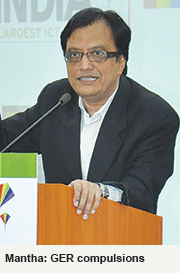 IT’S A CURIOUS PARADOX of india’s most industrial — and arguably most corrupt — state that vacancies in the state’s engineering colleges have spiralled above 34 percent from less than 1 percent in 2009, while simultaneously 94 additional colleges with an intake capacity of 67,181 additional students have become operational. A 21-member committee led by G.D. Yadav, vice chancellor of Institute of Chemical Technology, Mumbai, which investigated this phenomenon blamed the Delhi-based All India Council for Technical Education (AICTE), which approves and accredits all technical institutions countrywide, for the mess.
IT’S A CURIOUS PARADOX of india’s most industrial — and arguably most corrupt — state that vacancies in the state’s engineering colleges have spiralled above 34 percent from less than 1 percent in 2009, while simultaneously 94 additional colleges with an intake capacity of 67,181 additional students have become operational. A 21-member committee led by G.D. Yadav, vice chancellor of Institute of Chemical Technology, Mumbai, which investigated this phenomenon blamed the Delhi-based All India Council for Technical Education (AICTE), which approves and accredits all technical institutions countrywide, for the mess.
“AICTE is primarily responsible for the huge unutilised capacity in engineering colleges. In 2010, it introduced an e-governance initiative under which new technical institutes including engineering colleges could apply for registration and accreditation online. As a result a large number of substandard colleges were registered without proper background and verification checks. This has resulted in excess capacity and severe shortages of faculty, and poor quality of graduates who are hard put to find employment,” says Yadav.
However, Prof. S.S. Mantha, chairman of AICTE, is disinclined to accept the conclusions of the Yadav Committee. “AICTE’s fast-track college registrations and approval process is driven by the national interest. Currently the GER (gross enrollment ratio) in higher education is 18, which means of 100 eligible youth in the age group 18-23, higher education is accessible by only 18, of whom five opt for technical training education. Therefore our e-governance approvals policy is driven by the need to improve the GER. No education system in the world is devoid of vacancies and we believe quality will improve once institutions are up and running,” says Mantha.
However, neither the Yadav Committee nor its predecessors have examined why despite the nationwide shortage of faculty and rising student vacancies, there’s no dearth of would-be edupreneurs anxious to promote professional education colleges in Maharashtra. This is a sensitive issue because the great majority of aspiring edupreneurs are politicians adept not only at negotiating the thicket of rules, regulations and permissions required from the state government to promote greenfield education institutions, but also have huge hoards of dubiously acquired cash to invest.
“For politicians and businessmen with unaccounted cash to invest, promoting colleges is a low-risk enterprise because even if a college fails, campuses and infrastructure are appreciating assets. Moreover there’s always the possibility of a takeover, merger or conversion of a college into a tourist resort,” says a Mumbai-based realtor who preferred to remain anonymous.
Loosely monitored capacity creation in technical education has raised concern about the quality of ill-trained engineers and technicians let loose upon industry and society for quite some time. In 2008, the Yashpal Committee, constituted to review the functions of AICTE/UGC in the wake of changes in higher, professional and technical education in India, warned that “mushrooming engineering and management colleges, with some notable exceptions have largely become mere business entities dispensing very poor quality education.”
Earlier in 2006, the high-powered P. Rama Rao committee report for faculty development in technical institutions also commented that “the growth in the number of technical institutions in India during the past two decades has not been guided by any discernible policy”. “As governments were rapidly withdrawing their involvement in establishing new higher educational institutions, permissions granted to private investors to fill the void are mostly ad hoc,” says the report.
Yet these considerations and issues are unlikely to deter politically connected edupreneurs with huge cash hoards to invest in professional education colleges. The demand-supply gap in higher education is huge, while campuses are appreciating assets. Something’s gotta give.
Sunayana Nair (Mumbai)























